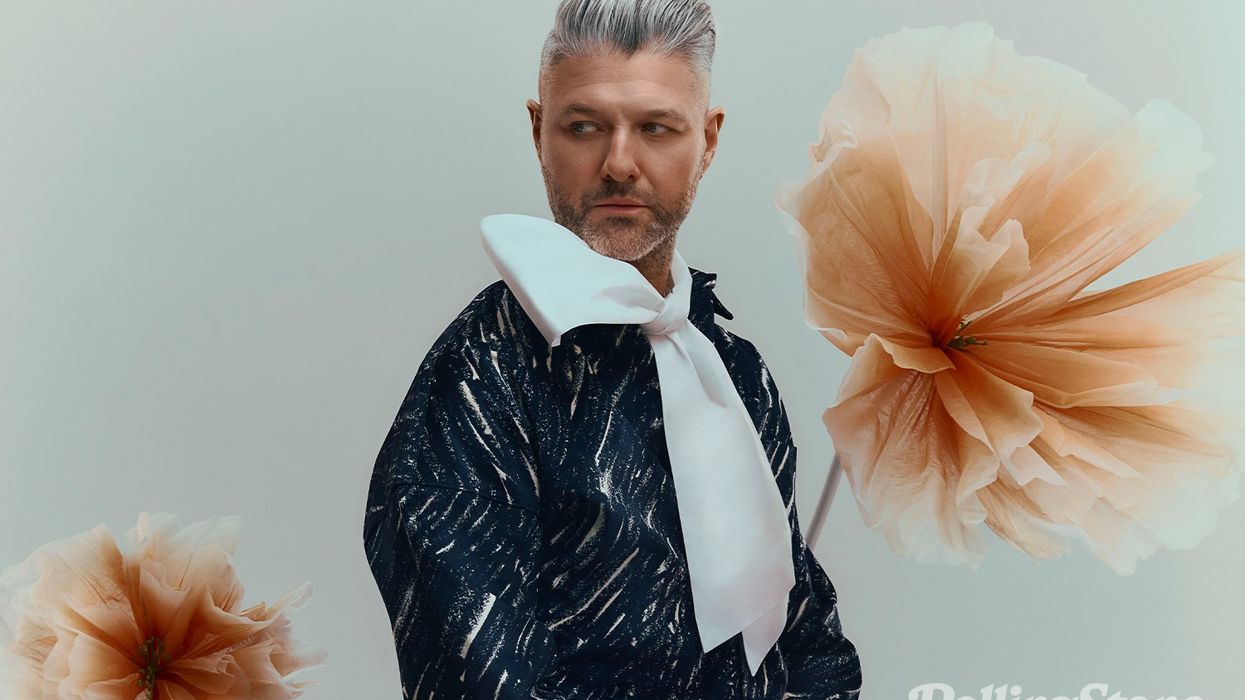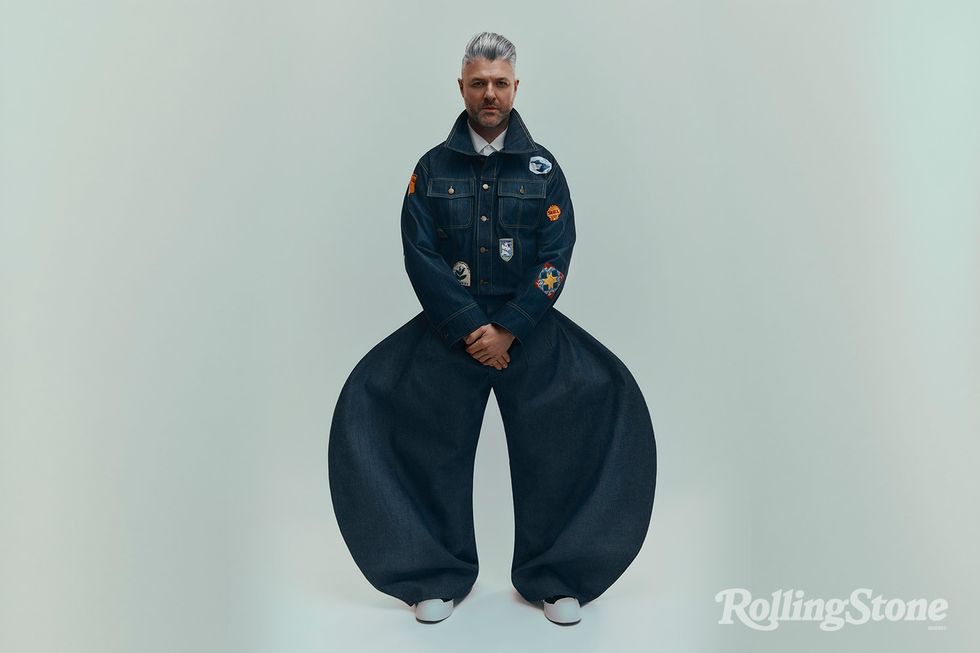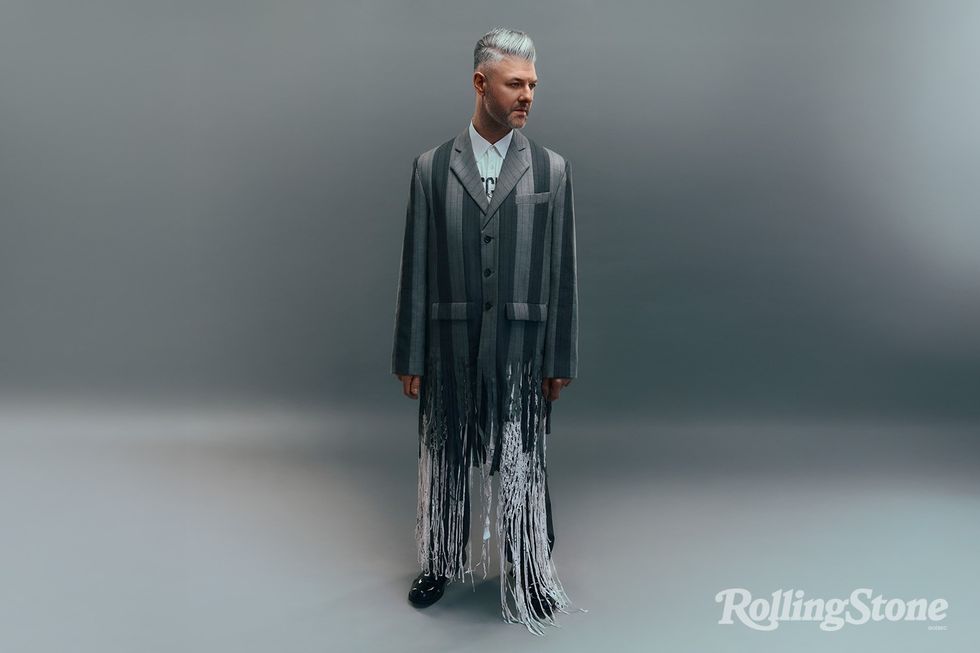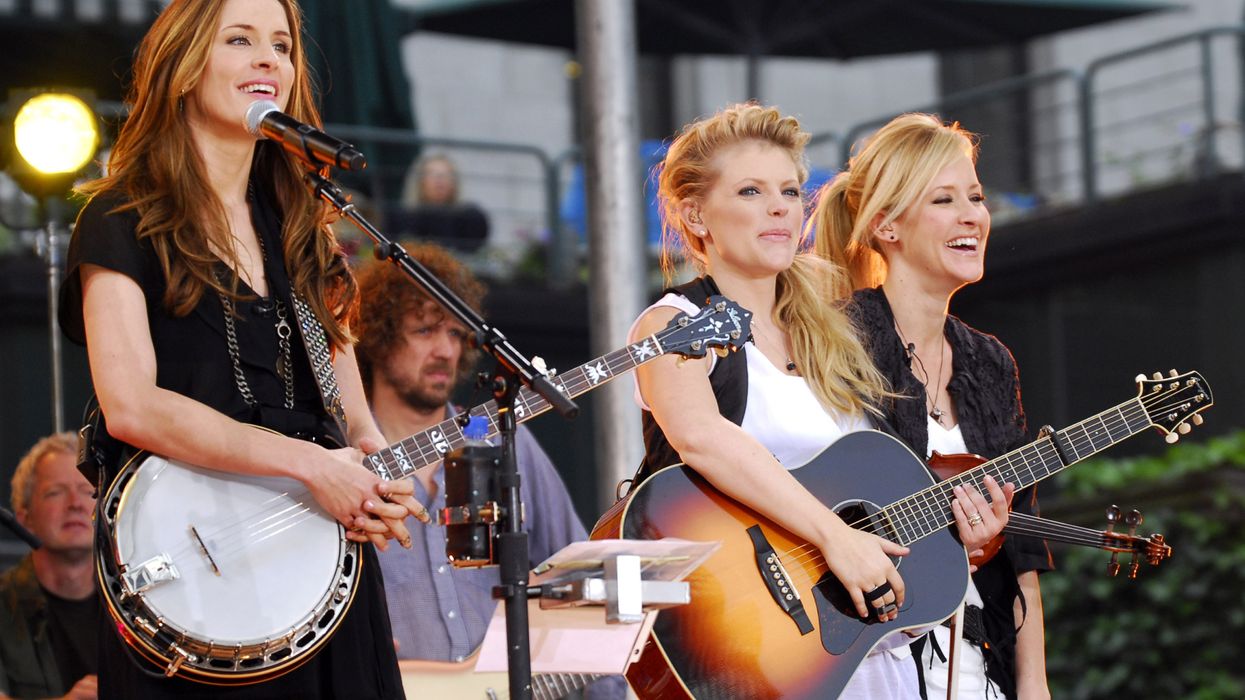It’s a cloudy May afternoon in New York’s Greenwich Village as Grace Cummings saunters down Jones Street. The Melbourne–based singer-songwriter, who titled her new album Ramona after Bob Dylan’s “To Ramona,” then pauses positively at West Fourth Street for a photo in the same spot where Dylan posed with Suze Rotolo six decades earlier for the Freewheelin’ Bob Dylan sleeve. Cummings’ jeans are paler than Dylan’s were, and her smile is broader as she studies the rufescent buildings and fire escapes that still adorn the street. She matches Dylan’s aloofness, though, since she forgets to check for traffic before crossing the street. A freewheelin’ taxi stops short with enough berth for her to pass safely.
With an embarrassed chuckle, Cummings enters the Coppola Café and asks for a “long black,” but the barista gives her a long blank stare instead. “You don’t know what that is,” Cummings concedes. The drink is simply too Australian.
She settles for a deconstructed Americano, and we position ourselves at a high-top table. A few hours ago, Cummings was asleep in her tour van before waking up to sing three Ramona tunes with her band on New York public radio. She took it in stride — her voice sounded so powerful, singing, “It’s the time to be Ramona,” that you’d have assumed she’d been warming up all morning — but now she can relax and take in the scenery.
“[The Village] makes me feel nostalgic for something that I’ve actually never lived before,” she says. “You grow up knowing what New York looks like even if you haven’t been here, so it’s almost this dream that you used to have.”
Cummings’ ability to evoke unexperienced nostalgia and other ineffable emotions — and feel them so deeply — is part of what makes her music special. On Ramona, Cummings’ third album of tumultuous folk-rock, her disarmingly deep, emotional voice, which feels like a thunderbolt if you’re not expecting it, pleads for understanding, and on her most desperate song, “A Precious Thing,” she howls, “Love is just a thing that I’m trying to live without.” You feel her loneliness. Ramona is one of the most dramatically gorgeous records released so far this year.
Jonathan Wilson, who produced Ramona, is still making sense of Cummings’ talent. “When people come to my studio, I’ll say, ‘Hey, here’s something that we did here,’ and if it’s a Grace song, they’re always just like, ‘What the fuck is that? Who is that?'” he says. “That’s a powerful thing.”
The songs on Ramona are deeply moving, but in no way do they hint at what to expect when meeting the real Grace Cummings, who, at 31, has an earthy, somewhat effervescent personality that belies the storminess of her music. She sits up tall and gesticulates broadly with her arms while speaking, her eyes always active. Before she recorded her first song, her C.V. consisted mostly of theater roles, and her background in acting has been instrumental in helping her deliver white-knuckle performances of her own songs.

“An actor once asked me, ‘How can you cry like that? What are you doing to make yourself cry?'” Cumming says. “And I said, ‘I’m believing the words that I’m saying, and I’m believing what I’m doing.’ So it’s kind of the same with music. If you’ve got a song and you believe it, you feel it when you play it because you believe in it.”
When she performs at another concert later this evening, she situates herself at the left half of a keyboard — where the lower, deeper notes reside — and closes her eyes, feeling each word and filling it with maximum emotion. “Does the whole world seem so blind?” she coos on “Help Is on Its Way,” Ramona’s final track and her encore song. Then she adds a little acid to her voice: “What’s keeping you alive, this time?” It turns out, she has a lot of answers to that question for herself.
WHEN WE SIT DOWN at the Coppola Café, Cummings lights up when she sees the iconic sun emblem that represents the Italian isle of Sicily on the back wall. She has a tattoo of the same smiling star on her right tricep as a tribute to the Sicilian part of her family. Her surname, though, is Irish, and she smiles like he tattoo as she recalls how she discovered an LP that her grandmother, Eileen O’Leary, once recorded, about 10 years after O’Leary’s death. “She would sing in a high soprano, half operatic and half quite Irish,” Cummings beams. “The songs on the record are Irish songs.” When Cummings knew her grandmother, she had been ill and only repeated the phrase “I do my best,” but the discovery of this record revealed a forgotten family connection to music that still brings a spark to her eyes.
Cummings grew up the youngest of three siblings, but she’s the only professional singer. Her sister sings only to Cummings’ niece, and “sometimes my brother sings to me when he has a couple of drinks,” she says. So other than the late O’Leary, Cummings says she’s unaware of any other strong singers in her bloodline. “The question that everybody asks me is, ‘Where does that voice come from?'” Cummings says, rolling her eyes. “And my answer is, ‘My throat.'”
Cummings’ parents gave her an idyllic childhood filled with beaches and nature. She grew up near a river and remembers seeing lots of snakes and a few kangaroos. They also loved music and enrolled her in piano lessons, though Cummings says she took them for granted and considers herself mostly self-taught.
Her parents also influenced her tastes by introducing her to Bob Dylan as an act of tough love. “When I was a kid, we all had to write a poem in class, and I wrote one about an ogre playing solitaire,” she recalls. “It all rhymed, and I thought it was pretty good. That night, I said, ‘Mum and Dad, the teacher got me up in class today to read this poem. She thought it was so good. Do you want to hear it?’ And then I read them the poem.”
Then Mr. Cummings pulled out Blonde on Blonde and gave her a reply that sounds almost comically Australian: “I think dad was like, ‘You want to hear some poetry? I’ll play you some poetry.’ I was like, ‘What about my poem?’ But he put on ‘Rainy Day Women,’ which was crazy. Dylan was one of the first people where, even as a small person, I thought, ‘This song has been written for me.'”
She soon became obsessed with Dylan’s music and then the Beatles’; she’d scribble her favorite lyrics on the bottom of a desk at home. She has since flexed her influences on covers of Nick Cave’s “Straight to You” and an unsurprisingly sultry rendition of Fatboy Slim’s “Praise You,” and the final stanza of “Help Is on Its Way” amalgamates allusions to the Beatles, Talking Heads, Dylan, and Neil Young in only 20 words. (And if that’s not impressive, she connected a concise history of Australian folk song into her own “Sweet Matilda.”)

Cummings first felt like a singer during the times she and her sister would produce their own “radio show” as children. The two of them recorded themselves hosting a program, making their own ads, and DJing songs that they sang themselves into a cassette recorder. “I was like, ‘I really love this feeling,'” she recalls. “I was like, ‘This is lovely.'”
But she kept that feeling to herself. Growing up, Cummings just wanted to fit in. “I’ve always felt different, and it’s confused me,” she says. “I’ve had a lot of mental health issues. I think I probably did as a child as well and didn’t know it, or my parents didn’t know. … I felt everything very intensely all the time, no matter what it was. I was very anxious. I didn’t know how to talk to people at all, or I talked to them too much. I just felt everything so much.”
She still feels this way. “I feel quite dissociated from the world and myself a lot of the time,” she says. “I think there’s a world that I would like to have that I go and visit sometimes. And then there’s the real one, which I don’t really feel part of a lot of the time.”
So Cummings sought ways of dealing with how she feels. She went to university, where she studied creative writing and Russian language (she demonstrates “hello” in Russian, catching a few ears in the coffeeshop) but dropped out with a semester to go so she could deal with a personal loss. She went to acting school, which led to roles in a play inspired by Aussie punk heroes the Saints called Prehistoricand a romantic thriller called Berlin.
She was interested in making music but felt shy singing publicly until a friend encouraged her to bust out a guitar at parties. She’d perform Neil Young and Dylan songs, and eventually her friend encouraged her to get onstage. Finally, she found the catharsis she needed. “It worked out pretty well, and I felt a tremendous relief from performing live as well,” Cummings says. “I thought, ‘This is what I’ve got to do.'”
Fortuitously, everyone else who heard her sing agreed, and she signed to Flightless Records (known for its long association with King Gizzard and the Lizard Wizard), which released Cummings’ debut, Refuge Cove, in 2019. Her voice is there, but there’s an overly raw quality to the songs that she resolved on her next album, 2022’s Storm Queen, which opened up the full spectrum of her songs with lusher production and backing vocals. When she snarls the words “Ava Maria” on “Heaven,” it’s Cummings’ arrival.

That year, Cummings DM’d Wilson, who had recently produced Angel Olsen’s Big Time, and asked to collaborate with him. So he listened to Storm Queen. “Not only was I struck by the sound and her voice, which is so insane, but I was struck by the couplets and the poetry,” he says. “It’s super fucking rare. And yeah, her voice is a once in a generation kind of thing.” She ended up recording Ramona with Wilson producing at his Topanga, California studio, sweetening her songs with strings and horns — making everything bigger for Ramona.
But before that could happen, Cummings got into an argument with an ex-partner of hers who had been abusive. In the aftermath, they put on some music. “[Dylan’s] ‘To Ramona’ was on the radio, and he said, ‘That’s you, Grace,'” she recalls. “I just went, ‘Whoa.’ I thought people might have seen me as a weak little bird at some points in my life, and I just let it happen. And I don’t think I am a weak little bird.”
She wrote the song “Ramona” through her tears about four minutes later, still in the car. “Where is your Ramona now?” she sings over buzzy guitar and rumbling piano. “She’s little, she’s sweet, she’s nothing at all to me.” It builds and builds until she accuses him, “I bet you dream about Ramona.”
“I told him, ‘We have to stop somewhere. My face is all puffy. I’ve been crying,'” she remembers. “And he says, ‘No, you look tragically beautiful.’ And I thought, ‘OK.’
“For the Ramona cover, I put on this wig, this dress, and different-colored eyes, even though you can’t tell,” she continues. “I tried to make myself a very romantic, tragically beautiful-looking idea of a woman.” The relationship lasted a little longer, but they broke up a long time ago and we agree not to give this guy too much credit for anything.
THE FIRST TIME Cummings sang “Help Is on Its Way” in front of an audience, she wept. “I just cried because it was the first time I’d ever given it to somebody else, but it’s out now and I’ve done it so I can kind of do it,” she says.
Cummings has learned to embrace the freedom and adventure of touring. She’s woken up atop Swiss mountains, describing pastoral scenes like something out of The Sound of Music, and she recently played a venue where Lead Belly once entertained a group of children in 1947. A few days earlier, Cummings was in Los Angeles and Wilson went to see her at a small room called Gold Diggers. “People in this club were gasping,” he remembers. “They’re saying things like, “Oh, my God,” seeing her the first time. I don’t know the last time that I’ve seen something like that.”
Tonight, she’s performing at Public Records, a Brooklyn venue that suffered a roof leak the night before, causing the stage to collapse partially and the electronics to fritz out. So Cummings and her bandmates have adjusted by gathering all their gear into the middle of the floor and performing in the round to a full audience. Despite the obvious frustration of working in an unfamiliar environment (Cummings performs barefoot), she gives her all to a dozen songs. “This is very hard to do in the dark,” she tells the audience, which cheers her on as she jumps between the keyboard and her red Telecaster.
“Work Today (and Tomorrow),” which features strings over her approximation of Beethoven’s “Moonlight Sonata” on Ramona, feels sparser, and when she sings about pushing through hardship, it’s electrifying. And “Common Man,” a slow-building ode to the freedom cowboys feel, explodes as she sings, “I can’t stand to be the common man.” It’s determination in real time.
“‘Common Man’ is an idea of freedom that is just not tangible,” Cummings explains, earlier in the cafe. “It’s not needing your mother or the blanket on your bed. I feel like that when I’m onstage. You don’t need anything to keep you safe.” It’s like a mantra Cummings sings, and like when she was acting, she believes this deeply. You can see her conviction onstage, especially with her performance of “Help Is on Its Way.”
So what is keeping Cummings alive this time? “My family, nature, music, art, thinking, kindness,” she says without blinking. “But when I wrote ‘Help Is on Its Way,’ it was telling myself, ‘Come on, sing a song, or be held by somebody else’s song.'”
For Cummings, either will do. “I write a lot of songs to keep myself company or because I’m lonely,” she says. “I want to hold my own hand. I want to feel something in my body. And being able to inhabit a song like that is like jumping into cool water.”







 Coat (polyester and wool), shirt (silk), Dries Van Noten, SSENSE.com / Flower (silk), M&S Schmalberg
Coat (polyester and wool), shirt (silk), Dries Van Noten, SSENSE.com / Flower (silk), M&S Schmalberg
 Blouson (denim and hand embroidered patches), WJ Crosson / Shit (polyester), Homme plissé Issey Miyake, Holt Renfrew/Pants from personal collection/ Shoes(canvas), Marni
Blouson (denim and hand embroidered patches), WJ Crosson / Shit (polyester), Homme plissé Issey Miyake, Holt Renfrew/Pants from personal collection/ Shoes(canvas), Marni Jacket and pants (virgin wool), shirt (acrylic coated cotton), Moschino / Shoes from Pierre Lapointe's personal collection
Jacket and pants (virgin wool), shirt (acrylic coated cotton), Moschino / Shoes from Pierre Lapointe's personal collection








